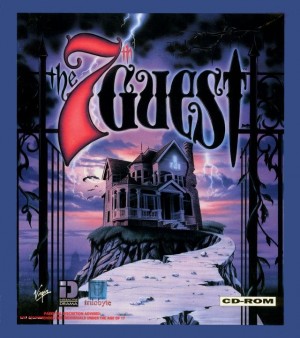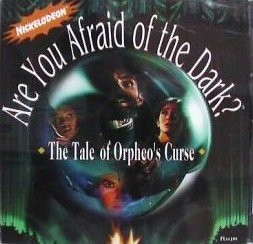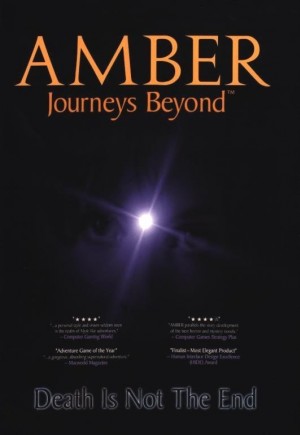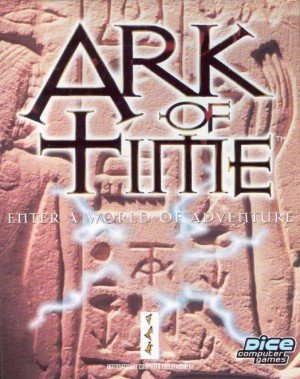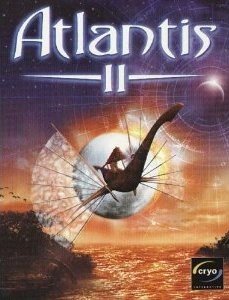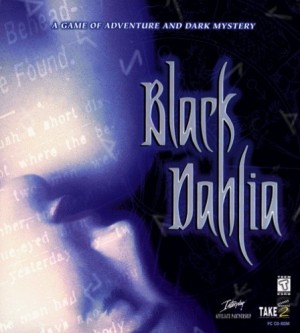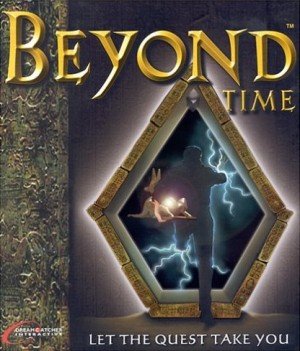IF Week Part 3: The Top Five IF Games page 3
I'm not going to waste too much time with an introduction here, because I know you're all itching for the countdown to begin! This article is meant to serve as a primer for those who are overwhelmed with the choices available to IF rookies. I will count down the top five games that have been given birth in the IF community since 1995, and also list five honorable mentions. Start with these ten games and you'll be well on your way to discovering the wonder of interactive fiction!
Each game includes a link to the game's page at Baf's Guide to the IF Archive. There you can find links to all pertinent information, as well as links to the necessary tools needed to play the games.
I really, sincerely hope you enjoy reading and playing as much as I have enjoyed writing. I would love to hear any feedback you have on this article; you can e-mail me at stinger@adventuregamers.com.
Now, without further ado, let's begin the count!
#5: ALL ROADS
by Jon Ingold
One guide to interactive fiction games has All Roads filed under the category of "To say anything about this game is probably to say too much." Having said that, I must be careful that I do not spoil anything for you. Baf's IF Guide has this game listed as "Historical" and "Science Fiction," and the blurb begins by describing it as a "supernatural espionage thriller in quasi-medieval Venice." If you're interested at all by that description, you should definitely play the game.
The game involves a technique that must be executed perfectly in order to work at all: a series of seemingly disconnected scenes that all come together perfectly at the end (at least, if you're paying attention). The ending is quite a satisfying surprise, and like any good "twist" movie (think Usual Suspects or Fight Club) you'll want to replay it a second time very quickly.
All Roads is what many IF fans would call "a game on rails," meaning there's really only one path through the game, with almost no puzzles to speak of. You're basically along for the ride. Sometimes this can be miserably boring (I found this to be the case with Rameses, a game which others worship), but if done well, and the ride is exciting and innovative, a game on rails can have amazing emotional impact.
Released for the 2001 IF Competition, All Roads became the only game in history to win both the Competition and the annual XYZZY awards, which usually tend to honor non-competition games. All Roads also won Best Setting and Best Story at the XYZZY's. History has already determined 2001 to be a weak year for interactive fiction, but this game shines far above the rest as a masterful example of storytelling.
One down, four to go!
#4: SHADE
by Andrew Plotkin
One of the many sub-genres in interactive fiction is "one-room IF," where an entire game takes place in one location. Some of these games are shorter than others; Shade is definitely on the longer side, although still short by normal IF standards.
It's "a one-room game set in your apartment" that starts off light enough, and slowly devolves into an absolutely disturbing masterpiece with an ending that will leave you stunned—and immediately desiring a replay. There is plenty of room for interpretation as to what actually happens to your character in the end; form your own opinion after two or three plays. Suffice it to say that Plotkin is a master of messing with your head, and this short work, to me, is his greatest masterpiece in that regard.
Shade, definitely the shortest game in this top five, was released for the 2000 IF Competition, which history has judged to be the best competition yet. Shade came in tenth, quite a bit too low in my opinion, and although it was nominated for six XYZZY awards, it only won Best Setting.
Such is often the fate of a game that refuses to be upbeat, instead opting for a decidedly dissonant tone. Andrew Plotkin should be proud for creating such a short game that can disturb the player so deeply.
Turn the page for number three!
#3: KAGED
by Ian Finley
A gifted storyteller can create an entire world from scratch and treat it as if it is as normal and natural as the world we are used to living in. A brilliant science fiction author can enchant us with a vision of the future, and at the same time frighten us with where our culture may soon be heading.
Ian Finley, author of many classic IF games, created the most enchanting—and downright scary—IF vision of the future with the aptly titled Kaged. The game casts you as a grey-uniformed worker in the "Citadel of Justice" in the Office of Documentation, where you serve as the Registrar of Seals. Your entire adventure takes place in the Citadel, as you investigate the cause of a "madness" that is spreading. The effects in the Department of Enforcing and the Office of Filing have already been fatal, and your covert investigation (done behind the back of the High Inquisitor, a dangerous proposition to be sure) will lead you to a breathless split ending allowing you a final choice in your destiny.
More than any other IF game I have ever played, Kaged allowed me to truly visualize my world. The walls of the Citadel are cold and grey, cameras everywhere to ensure no employee dissension. The living quarters are sterile and unwelcoming. It is somehow enchanting, but frightening also, and the ultimate resolution of your quest is remarkably satisfying.
Kaged was entered into the 2000 IF Competition, and came away with a hotly-contested victory in what many have called the best competition ever. Tragically, it was almost completely shut out in the XYZZY's, with only a nomination for Best NPC. Surely the single greatest science fiction game to ever spring out of the community deserved better. This is the type of game that can enchant the sci-fi fan, and make a fan out of the sci-fi skeptic.
In short, Kaged is an absorbing and compelling work of art, and a must-play for everyone who loves getting lost in a story.
We're in the home stretch now; two to go!
#2: PHOTOPIA
by Adam Cadre
Photopia is, without a doubt, the single most important work of interactive fiction ever to come from the IF community. It is an emotionally shattering masterpiece, a heartrending and gorgeous work of art...and it is a manipulative cop-out, a puzzleless snoozefest, and the downfall of IF. All depends on who you ask.
Photopia ran away with the 1998 IF Competition, no surprise even considering a fairly strong field. Although there is an unwritten code of silence during the voting stages of the competition to prevent unfair influence, the debate raging over Photopia could not be stemmed. For this game was the first notable example of, as Carl Muckenhoupt brilliantly put it, "interactivity at the service of fiction, rather than vice versa."
To share any of the story would detract from the experience, and the experience of playing through Photopia for the first time is an irreplaceable one, a half-hour to be treasured. The game begins in a speeding car with two frat boys, and ends in a baby's nursery. Besides one rather brilliant maze (nominated for Best Puzzle in the XYZZY's), the game is completely puzzleless, fully playable in half an hour by even the most novice of IF newbies. About twenty minutes in, when the series of seemingly disconnected and unordered scenes snaps into place and you understand what is happening, every emotional bone you possess will tingle sharply, and your pounding heart will carry you through to the inevitable conclusion of the story. You will understand, as I did, the emotional impact that a story can have. I have cried each of the three times I have played through Photopia; it is that darn powerful.
Despite the vociferous criticism of Photopia, generally thought of as the penultimate "IF on rails" game, the vast majority of posted reviews hail it as nothing short of an epic masterpiece. I will make no quarrel with that statement, and would rather like to expand on it...but words have failed me every time I've finished the game.
Please, I beg you, if you have not played Photopia before, make sure that you can set aside a half hour where you will not be distracted. Disconnect the phone, log off of your IM programs, and be sure you're using an interpreter that can handle color text, it's an essential part of the game. Photopia is emotionally wrenching, far transcending the level of a game and becoming an experience.
1998 was, without a doubt, the best year ever for interactive fiction, and Photopia only captured two of the seven XYZZY's it was nominated for: Best Writing and Best Story. This is probably due to an unfortunate bias against competition games, although it could also be due to what some would say is a weak ending (I would tend to agree, though it is a small blemish on an otherwise perfect story). Photopia is an eternal classic, and an essential part of any IF primer.
This was the second IF game I ever played, and immediately I knew it would be #1 on my list forever. Yet here it stands as #2. What could possibly top such a beautiful game?
Hardcore IF fans will not be surprised at all when I say that my #1 game is also from 1998. Think you know what it is? You might be surprised...
#1: ANCHORHEAD
by Michael Gentry
Ranking a game above Photopia was no easy choice, I assure you, and I made this decision with a lot of thought and consideration. As I played my way through Michael Gentry's epic Anchorhead, I began to feel more and more like I was playing something with a legitimate claim to the top spot. The acid test, I decided, would be the ending; if I felt the conclusion was ultimately satisfying, I would rank it #1.
Not only is the conclusion satisfying, it is horrifying and disturbing...and absolutely brilliant. It made every single minute I spent on this amazing journey worth it.
Anchorhead is a horror game, making no apology for paying homage to the best of H.P. Lovecraft's work. Gentry brilliantly casts the main character as a female, and takes full advantage of the new emotional dimension offered by this choice. The story takes place in a small university town, and horrifically unfolds to a masterful epic involving a gruesomely murderous monster, and a purely evil force gathering strength before your eyes, with you as the only one able to save the world. It sounds over the top; somehow it never feels that way at any point.
Gentry simply did everything right with this game. He is a brilliant writer, a masterful plotter, and an exceptional programmer (bad coding has ruined many a text adventure). The scope of this game is mind-boggling; I have been dabbling in Inform programming recently and I am awestruck at the sheer magnitude of the code in this game. Unsurprisingly, Gentry states he spent more than six hours a day on the game until it was finished. There is probably more text in this game than the other four games in this top five combined.
The game is flat-out scary, an amazing feat for any game, but even moreso considering we're talking about a black and white text adventure! It is best played in a dark room, when you are able to devote your full attention to what is on the screen, and allow your imagination to run wild with the images confronting you. Anchorhead is also very much a game for mature audiences; it is full of strong language, gore, references to incest, and just generally disturbing events. Those who are mature enough to handle it will undoubtedly appreciate the breadth of the storytelling taking place.
I guess the most flattering thing I can say about Anchorhead is this: I played between eighty and a hundred games in preparation for this article. Anchorhead is the only one that I felt like I should have paid for. It does not feel like an amateur community game; it feels like something commercial. I spent more time playing this game than I did on Full Throttle and Last Express combined, and not because the puzzles were unsolvable. It is just simply that expansive, and challenging without ever becoming frustrating.
The game certainly would have been unsuccessful as a competition game (all comp games must be solvable in under two hours; Anchorhead requires at least twice that). I believe it would have swept the XYZZY's in any other year; unfortunately, up against Photopia and Spider and Web, as well as Gentry's own remarkably offbeat Little Blue Men, Anchorhead could only manage a win for Best Setting and five other nominations.
Still, in my book this game is the ultimate work of interactive fiction, overflowing with intrigue and compelling story elements, scary and engrossing, exceptionally written and impressively coded with a remarkable eye for detail. Michael Gentry has not released an IF game since 1998; one can only hope that he will make a return to the community sooner rather than later and remind us again of the glory days of epic text adventures that Anchorhead so vividly recalls.
Not a doubt or conflict in my mind; this masterpiece is the pinnacle of all the IF community has offered in the last eight years. Play it through to the end, and I promise you'll agree.
Next: Five honorable mentions.
Here are five other games that could make legitimate arguments for a spot on any similar top-five list, in chronological order of release:
Delusions - A compelling work of science fiction that really seeks to mess with your head. Disturbing and innovatively structured, and undoubtedly will remain on the mind of the player well after it is completed.
Spider and Web - The game that beat both Anchorhead and Photopia in the 1998 XYZZY's, would be #1 on many lists. I personally was let down by the final ten minutes of the game, but the storytelling device up to that point is second to none in its brilliance, and the story itself is extremely intriguing.
Varicella - Adam Cadre's espionage/horror/humor game, referred to by Duncan Stevens as "possibly the most disturbing work of IF ever written." It takes place in a small Italian palace, and features all manner of murderous intrigue. The game ends after a set number of moves, and that number is small enough to demand numerous replays in order to fully understand what is going on in this palace. The size of the game file is almost as large as Anchorhead.
Worlds Apart - Suzanne Britton's sorely underrated fantasy adventure requires a lot of patience, but is ultimately absorbing and extremely unique. It also introduces a previously unforseen level of depth and backstory for NPCs.
Galatea - As much of a "work of art" as interactive fiction can be, this game consists of nothing more than a conversation with an inanimate statue. Sounds boring, until you play through it more than once and begin to realize what an amazing job of coding Emily Short has done. The titular NPC has more complexity and psychology than any NPC in the history of IF. A remarkably unique experience.
Tune in tomorrow for a profile of five important names in the IF community!



